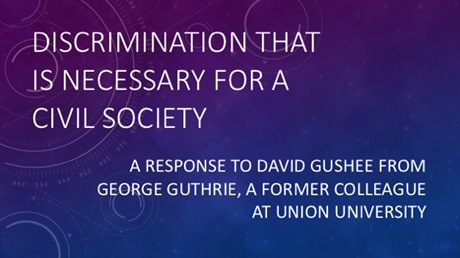Is it possible to embrace appropriate distinctions between social equality and uniformity of beliefs?

Recently, in a Religion News Service column entitled, “On LGBT Equality, Middle Ground is Disappearing,” professor David Gushee fired a warning shot over the bow of tens of millions of religious Americans who refuse to adjust their beliefs and get in line with the new social orthodoxy on LGBT affirmation.
Conservative commentator Rod Dreher (“We Have Been Warned,” at The American Conservative) tagged Dr. Gushee’s column as “extraordinarily important” since it states so clearly the nature of that orthodoxy and the length to which some are willing to go to enforce it.
Others responded with alarm to the seeming Orwellian “thought police” tone of Gushee’s piece, to which he rejoined in a follow-up post that he merely was being descriptive, not prescriptive, a spectator rather than a “Crusader” intent on crushing the opposition.
A vital element is missing from this conversation on discrimination and especially from Dr. Gushee’s framing of the situation. The term itself connotes two primary meanings, both of which are significant for the discussion. According to The Concise Oxford Dictionary, the term “discriminate” means to:
1. “recognize a distinction” (perceive or constitute the difference in or between) or
2. “make an unjust distinction in the treatment of different categories of people, especially on the grounds of race, sex, or age.”
Dr. Gushee uses the word discrimination with the second of these two meanings, focusing “on the question of whether LGBT persons should be treated as full equals, without any discrimination in society.”
So far so good. This form of discrimination does not fit civil society. …


